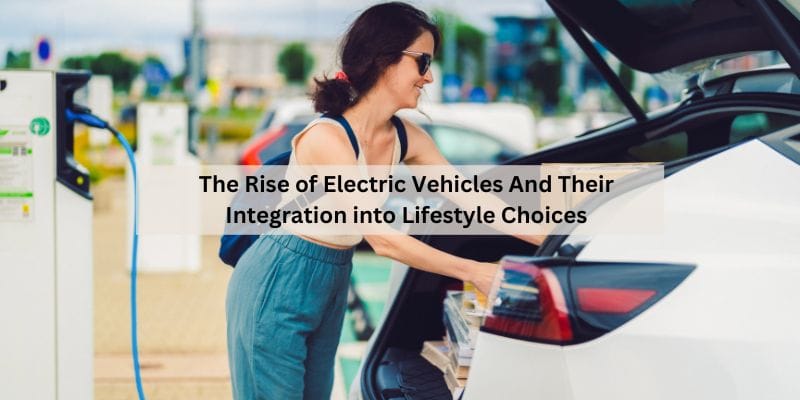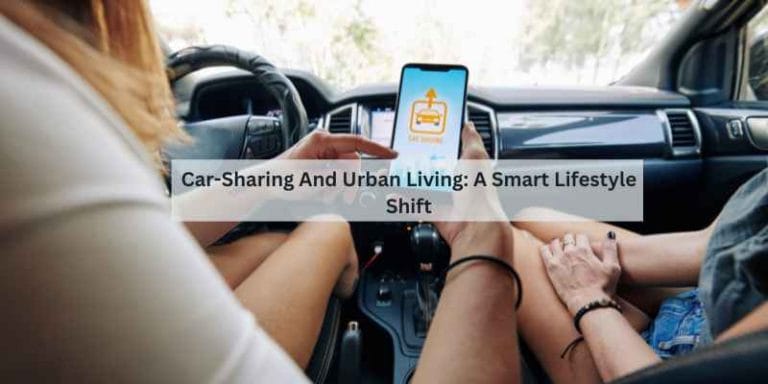The Rise of Electric Vehicles And Their Integration into Lifestyle Choices
The rise of electric vehicles (EVs) has led to a transformation in lifestyle choices as more individuals opt for eco-friendly transportation. With heightened awareness and concern for environmental sustainability, consumers are choosing EVs to align their lifestyles with eco-friendly values.
The global push to curb carbon emissions has also contributed to the increasing popularity of EVs. As a result, the integration of electric vehicles into everyday life has become more prevalent. This shift towards sustainable transportation reflects a conscious decision by individuals to make a positive impact on the environment.
By embracing EVs, people are not only reducing their carbon footprint but also embracing a more sustainable and environmentally friendly lifestyle.
The Green Revolution: Electric Vehicles
The rise of electric vehicles has brought significant benefits for urban air quality. With no tailpipe, pure electric cars produce no carbon dioxide emissions when driving, reducing air pollution considerably. Besides addressing an important public health hazard, electric vehicles can help communities meet their budget challenges. They can lower vehicle fueling costs by half, or more, thanks to their higher efficiency and the lower cost of electricity per unit of energy delivered compared to gasoline or diesel fuel. The heightened awareness and concern for environmental sustainability have emerged as key drivers for consumers opting for electric vehicles. It encourages a shift toward sustainable lifestyles, reflecting a conscious decision to align with eco-friendly values.
Economic Impacts Of Adopting Evs
The economic impacts of adopting electric vehicles (EVs) are significant. Fuel savings are a key factor, as the cost of electricity is substantially lower than gasoline, resulting in substantial savings over time. Additionally, maintenance costs for EVs are generally lower compared to traditional gasoline vehicles, due to fewer moving parts and less frequent maintenance requirements. These cost savings make EVs an attractive option for budget-conscious consumers, contributing to their increasing adoption.
Electric Vehicles And Lifestyle Changes
The rise of electric vehicles is transforming lifestyle choices by encouraging a shift towards sustainable living. With a global push to reduce carbon emissions, more individuals are opting for electric vehicles to align their lifestyles with eco-friendly values. This conscious decision reflects a growing concern for environmental sustainability and contributes to a cleaner, healthier environment.
Integration Into Smart Cities
The rise of electric vehicles (EVs) is playing a significant role in the integration into smart cities. EVs are becoming a key consideration in urban planning as cities strive to reduce emissions and promote sustainable transportation. This integration involves the development of smart charging infrastructure to support the growing number of EVs on the roads. The deployment of charging stations at strategic locations within cities is crucial to ensure convenient access for EV owners. Furthermore, the integration of EVs into smart cities aligns with the goal of promoting sustainable lifestyles and reducing the environmental impact of traditional vehicles.
Consumer Choices And Market Trends
The growing demand for electric vehicles (EVs) is a clear indication of the shift in consumer choices and market trends. With heightened awareness and concern for environmental sustainability, an increasing number of individuals are opting for EVs to align their lifestyles with eco-friendly values. The major benefit of EVs is the contribution they make towards improving air quality in towns and cities, as they produce no carbon dioxide emissions when driving. This has a significant impact on energy consumption patterns, with communities meeting their budget challenges and lowering vehicle fueling costs by half or more. The integration of EVs into the existing power grid infrastructure, also known as vehicle-grid integration (VGI), is another aspect that is transforming the world around us. All forms of EVs can help improve fuel economy, lower fuel costs, and reduce emissions, encouraging a shift towards sustainable lifestyles.
Challenges In Ev Adoption
The adoption of electric vehicles (EVs) is not without its challenges. Infrastructure development is one of the major hurdles that EVs face. The charging infrastructure is still in its nascent stage, and there is a lack of public charging stations. This has led to range anxiety among consumers, which is the fear of running out of power during a trip due to the limited range of the vehicle and the lack of charging infrastructure.
| Challenges in EV Adoption |
|---|
| Infrastructure Development |
| Range Anxiety Among Consumers |
The Future Of Electric Vehicles
The future of electric vehicles is exciting, with continuous innovations in battery technology driving their advancement. Global EV adoption trends indicate a significant shift towards sustainable transportation choices. Electric vehicles contribute to improving air quality by producing no carbon dioxide emissions, reducing air pollution in cities. Additionally, they help communities meet budget challenges by lowering vehicle fueling costs through higher efficiency and lower electricity costs. Grid integration of electric vehicles is revolutionizing the road, as more individuals choose electric models to align their lifestyles with eco-friendly values, promoting sustainable urban design and a conscious shift towards sustainable lifestyles. The rise of electric vehicles is transforming the world around us, with a global push to curb carbon emissions and embrace sustainable transportation options.
Economic And Environmental Policy Support
Support for economic and environmental policies is crucial for the integration of electric vehicles into lifestyle choices. The rise of electric vehicles is transforming the way people commute, contributing to cleaner air and sustainable living practices. Embracing electric vehicles aligns with eco-friendly values and promotes a shift towards sustainable lifestyles.
Frequently Asked Questions
How Has Electric Cars Changed Our Lives?
Electric cars have changed our lives by significantly improving air quality in cities. With zero tailpipe emissions, they reduce air pollution and contribute to a healthier environment. Additionally, electric vehicles help lower fuel costs, improve fuel economy, and reduce overall emissions.
They are an eco-friendly choice aligned with sustainable lifestyles.
How Did Electric Cars Impact Society?
Electric cars have had a significant impact on society. They have helped improve air quality by producing zero carbon dioxide emissions. Additionally, electric cars have lowered vehicle fueling costs and provided budget savings for communities. These vehicles have also encouraged a shift towards sustainable lifestyles and aligning with eco-friendly values.
Overall, electric cars have revolutionized the road and are contributing to a more sustainable and environmentally conscious society.
What Is Electric Vehicle Integration?
Electric vehicle integration refers to the process of incorporating electric vehicles into the existing power grid infrastructure. This allows for the seamless charging and utilization of electric vehicles, enabling them to become an integral part of our transportation system.
Conclusion
The rise of electric vehicles has not only revolutionized the automotive industry but also transformed our lifestyle choices. With a growing concern for environmental sustainability, more individuals are opting for electric models to align their lifestyles with eco-friendly values. Electric vehicles offer a significant contribution towards improving air quality and reducing carbon emissions, making them a conscious and sustainable choice.
As we continue to witness advancements in technology and infrastructure, the integration of electric vehicles into our daily lives is set to become more seamless and widespread. Embracing electric vehicles is not just a trend, but a step towards a greener and more sustainable future.






